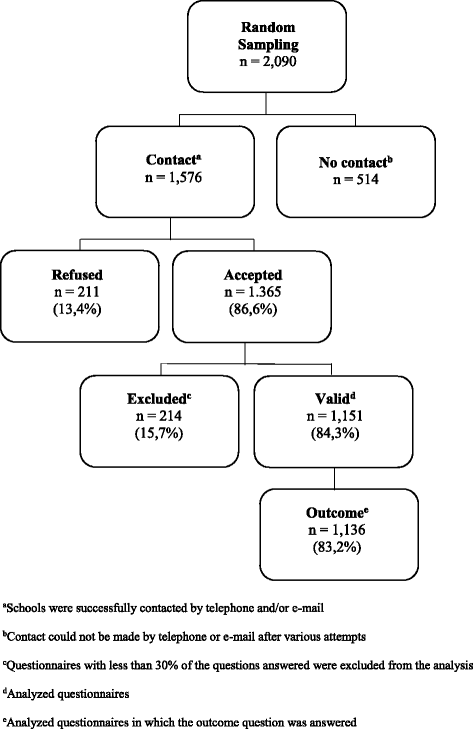Drug use prevention: factors associated with program implementation in Brazilian urban schools
- PMID: 29514619
- PMCID: PMC5842571
- DOI: 10.1186/s12889-018-5242-y
Drug use prevention: factors associated with program implementation in Brazilian urban schools
Abstract
Background: A school is a learning environment that contributes to the construction of personal values, beliefs, habits and lifestyles, provide convenient settings for the implementation of drug use prevention programs targeting adolescents, who are the population group at highest risk of initiating drug use. The objective of the present study was to investigate the prevalence of factors associated with implementing drug use prevention programs in Brazilian public and private middle and high urban schools.
Methods: The present population-based cross-sectional survey was conducted with a probability sample of 1151 school administrators stratified by the 5 Brazilian administrative divisions, in 2014. A close-ended, self-reported online questionnaire was used. Logistic regression analysis was used to identify factors associated with implementing drug use prevention programs in schools.
Results: A total of 51.1% of the schools had adopted drug use prevention programs. The factors associated with program implementation were as follows: belonging to the public school network; having a library; development of activities targeting sexuality; development of "Health at School Program" activities; offering extracurricular activities; and having an administrator that participated in training courses on drugs.
Conclusions: The adoption of drug use prevention practices in Brazilian schools may be expanded with greater orchestration of schools through specialized training of administrators and teachers, expansion of the School Health Program and concomitant development of the schools' structural and curricular attributes.
Conflict of interest statement
Ethics approval and consent to participate
Informed consent was obtained from all individual participants included in the study.
The participants, after accessing the link available in the message, were sent to a screen with a complete informed consent and, after reading it, chose to click on “accept” or “not accept”. Participants who agreed to participate were directed to the screen of the questionnaire. The consent form and ethical research procedures were approved by the Ethics Committee of Universidade Federal de São Paulo (no. 250.091).
Consent for publication
Not applicable.
Competing interests
Dr. Sanchez is an Associated Editor at BMC Public Health.
Publisher’s Note
Springer Nature remains neutral with regard to jurisdictional claims in published maps and institutional affiliations.
Figures
References
Publication types
MeSH terms
Grants and funding
LinkOut - more resources
Full Text Sources
Other Literature Sources
Medical


